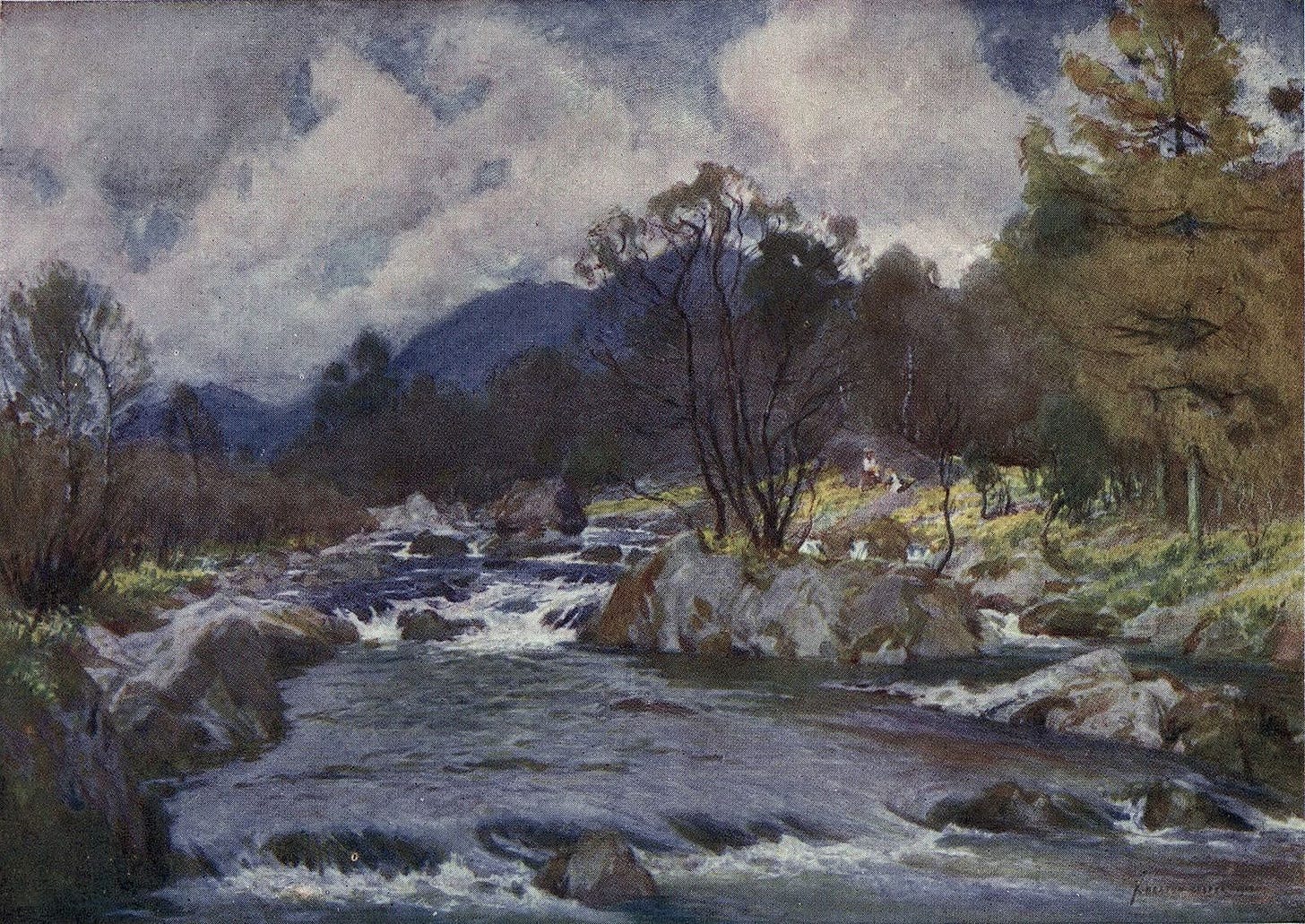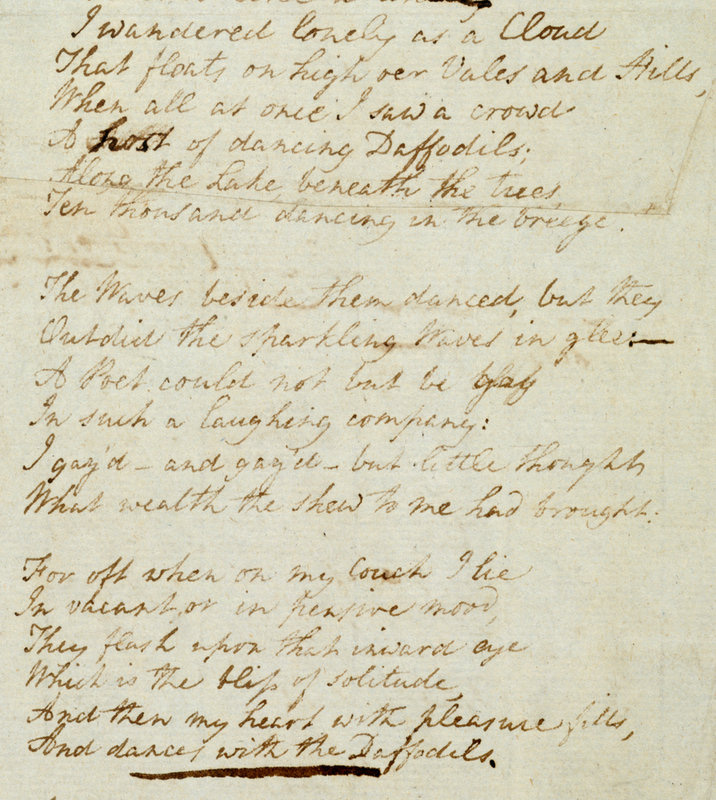Golden, dancing, jocund, laughing daffodils
Wordsworth revised his famed 'Daffodils', also known as 'I wandered lonely as a cloud' in 1815. The version here, written in 1804 and published in 1807, is perhaps less familiar.
I wandered lonely as a Cloud That floats on high o'er Vales and Hills, When all at once I saw a crowd, A host, of dancing Daffodils; Along the Lake, beneath the trees, Ten thousand dancing in the breeze. The waves beside them danced, but they Outdid the sparkling waves in glee:— A Poet could not but be gay, In such a laughing company: I gaz'd—and gaz'd—but little thought What wealth the shew to me had brought: For oft when on my couch I lie In vacant or in pensive mood, They flash upon that inward eye Which is the bliss of solitude, And then my heart with pleasure fills, And dances with the Daffodils.

What we love about this poem…
The animate daffodils outdo in freshness and verve both the shore breeze and high hills. Their riotous abundance where they were not expected, crowded right along the pebbled shore of a windswept lake, is a sudden and welcome clash of mood with the lonely cloudlike wanderer of the first line. The daffodils’ special power is that of interruption: they seem to boisterously throng in and forcibly cheer up this lofty drifter!
Getting the daffodils right was important. Wordsworth changed several of the words describing them when he revised this poem for his later edition. ‘Dancing’ becomes ‘golden’, and ‘laughing’ becomes ‘jocund’, for example. He also added a second stanza:
Continuous as the stars that shine
And twinkle on the milky way,
They stretched in never-ending line
Along the margin of a bay:
Ten thousand saw I at a glance,
Tossing their heads in sprightly dance.
The ‘inward eye’ of the last stanza makes it suddenly clear that this is a poem as much about remembering as it is about the surprise of spring flowers. Written in 1804, recollecting an April walk in 1802, this poem is already invested in the work of the mind’s eye. But the composition of this poem also relies on a collaborative approach to memory. Poet and diarist Dorothy Wordsworth, William’s sister, also remembered ‘laughing’ daffodils from this walk that they made together in Ullswater. She wrote about the walk in her journal, a text used by Wordsworth when writing this poem:
‘we saw that there was a long belt of them along the shore, about the breadth of a country turnpike road. I never saw daffodils so beautiful they grew among the mossy stones about & about them, some rested their heads upon these stones as on a pillow for weariness & the rest tossed & reeled & danced & seemed as if they verily laughed with the wind that blew upon them over the Lake, they looked so gay ever glancing ever changing.’
Both Dorothy Wordsworth and Mary Hutchison, who married William in 1802, were intimately involved in the transcription and composition process of much of his poetry. Wordsworth recorded in the Fenwick Notes (dictated to his friend Isabella Fenwick) that there were two lines contributed by Mary to this poem: ‘They flash upon that inward eye | Which is the bliss of solitude’. He calls them the ‘two best lines in it’!

About the Author
William Wordsworth (1770-1850) is associated, along with collaborator and poet Samuel Taylor Coleridge, with the Romanticism movement. He is best known for the collection Lyrical Ballads (1798), jointly published with Coleridge.
Wordsworth’s great work of life writing and poetic recollection, The Prelude, was written and revised over many years and eventually titled and published by Mary Wordsworth in the year of his death. You can read past newsletters featuring Wordsworth in two excerpts from The Prelude: Perseverance and Growing up in nature.
To read alongside…
Ravenna, a poem by Oscar Wilde recollecting travels in Italy, begins with English spring flowers, including “Fond snowdrops, and the bright-starred daffodil”. Wilde won the 1878 Newdigate Prize with this poem. The Sir Roger Newdigate Prize is awarded to an Oxford student for the best composition in English verse not exceeding 300 lines in length, and the winner is usually announced in mid-Spring.
A winner in recent years (2022), Maggie Wang, also writes of spring life and poetic attention in ‘Do not be afraid of reading this poem.’
We have featured other poems about flowers in past newsletters, such as in this sonnet on violets, which we think might here be symbolic of same-sex love: Alice Moore Dunbar-Nelson, ‘Sonnet’
If you’re in Oxford, don’t miss a special event every day next week!
Ten Minutes with LitHits
Monday 18 March – Sunday 24 March, 1.40pm | Space for Reading, Blackwell Hall
Take a break from your day and join LitHits to sample a ten-minute book club. LitHits at Oxford University’s Faculty of English is a library of short-form literature starting from the question: how long do you have? If you’ve ever wondered about tackling Ulysses, or Moby Dick, or want to discover the short stories of Kate Chopin and the poetry of Claude McKay, come for a quick hit of literature and a chat with the LitHits team. All you need is 10 minutes! No preparation required – just turn up, listen and share your thoughts if you wish.
https://visit.bodleian.ox.ac.uk/olf
This is a free series of events for the general public and part of the Bodleian hub for the Oxford Literary Festival. ‘Ten Minutes with LitHits’ will be run by Kirsten Shepherd-Barr, Alexandra Paddock, and Daniel Abdalla, the core LitHits team.
Curator’s Corner
Today’s newsletter was curated by Dr Alexandra Paddock, one of the lead curators of LitHits and Project Manager of ‘Revolutionising Reading’.
Suggest a LitHit!
Tell us your own favourites from literature you've read, and we can feature you as a Guest Curator. Just email us with the following information:
Your full name
The title of the book you're suggesting
The location of the excerpt within the book (e.g., "in the middle of chapter 5"), or the excerpt itself copied into the email or attached to it (in Word)
Why you love it, in just a few sentences
About LitHits
LitHits helps you make time for reading by bringing you unabridged excerpts from brilliant literature that you can read on the go, anytime or any place. Our curators carefully select and frame each excerpt so that you can dive right in. We are more than a book recommendation site: we connect you with a powerful, enduring piece of literature, served directly to your mobile phone, tablet or computer.
You might also enjoy...
Feedback
We'd love to hear your thoughts on our newsletter:
kshepherdb@yahoo.co.uk
Graphic design by Sara Azmy
All curation content © 2024 LitHits. All rights reserved.



